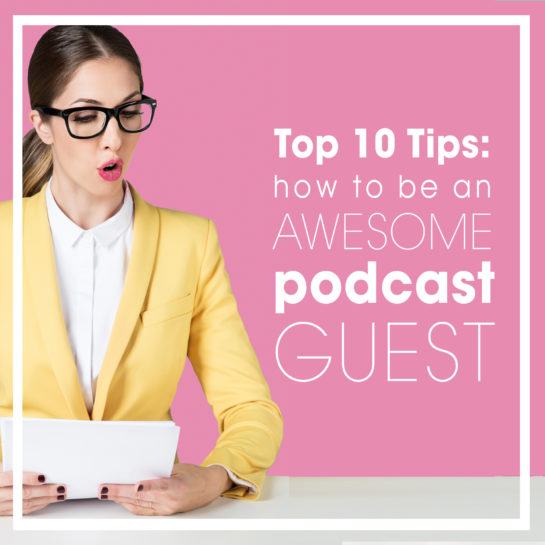Podcasts are created by the people, for the people.
If you want to connect to the people (and potentially new clients), you should pitch yourself to podcasters regularly. As in, weekly.
After pitching myself a bunch last spring (AKA 30 Podcasts in 30 Days), I broke my own rule and took a 3-month hiatus.
Basically, I stopped focusing on my own business and poured my limited I-just-had-a-baby brainpower into my clients’ projects, which is fabulous for my clients but not so fabulous for my own business. Whoopsie.
Now that I’m reemerging from my cave, I’ve decided to do something unprecedented. I’ve decided to actually listen to my own advice. Shocking, I know.
It’s time to start pitching myself, again. Because let’s face it – podcasting is an easy way to share your experiences, stories, and expertise with the world. And more importantly, podcasting is the best way to share your personality with a new audience. And in today’s crowded online market …
… personality will win every-single-freakin’-time.
Because people do business with people they like.
So rather than exhausting myself with 30 pitches in 30 days again (yeaaah, that was nuts!), I’m focused on slow and steady outreach, Tortoise-style, if you will.
I am SO not the Hare these days. I’m all about the slow hustle and pitching to one or two podcasts I’m diggin’ each week. That’s it.
In order to prep myself for upcoming podcast interviews, I pulled together my own “TOP 10” list of tips … because a) if you want to be an awesome podcast guest, you need to prepare like a pro, AND b) who doesn’t love a “TOP 10” list?
Without further ado…
TOP 10 TIPS FOR BEING AN AWESOME PODCAST GUEST
10. Dare I say, go “off brand”? Podcasts are about being real and cutting out the baloney. Sure, your marketing materials and website should look polished and professional, but when you want to connect with a new audience via audio, you need to talk to your host and the audience like you’d talk to a friend. Be real. Talk like a human, not a “brand”.
9. Avoid the elevator pitch. Cliche messages are perfect for posters, coffee mugs, and T-shirts, but not for podcasts. We want juicy details, riveting stories, and real emotion. If all of your answers sound like one schmoozy elevator pitch, we won’t trust you. TIP: If you want to understand the audience, just ask the host. The host is your guide.
8. “Care about YOUR audio. Be serious about it. Don’t think all you have to do is be on your phone and it’s all good. Going on a podcast and being ONLY on the phone and walking around or being in some place that is super noisy is like you showing up to have a business meeting straight out of bed without even brushing your teeth. You not only make yourself ‘look’ bad but also the podcast you are on, and the podcaster will more likely than not, not promote your episode if the audio sucks.” [Thank you to Elsie Escobar for contributing #8 to our Top 10 List].
7. Listen to one or two previous shows before you jump into your interview. This is an easy one to forget but it’s crucial. You should know the general vibe, the structure, the host’s personality and likes/dislikes before showing up on the show. If your host hates talking about politics, and you bring it up over and over again, it’s pretty clear that you didn’t do your homework. It should also go without saying that if your host sends you prep questions, you should take a few minutes to review those questions. The host wants to make you look good! Don’t self-sabotage.
6. Answer the question. If you are asked a question, answer it. We’re not politicians – thank goodness! As soon as you start skating around questions, your listeners question your M.O. And don’t forget – once you’ve finished answering a question, stop. “Don’t ramble to fill the silence. Dead air is the interviewer’s problem.” [Shout out to Maggie Patterson for that brilliant tip].
5. Laugh. Yeah, we need more laughter in our chaotic work days. Laughter is contagious, even when spread via audio. Lead the laughter and lighten the mood for the listeners. We want to giggle with you and feel like besties.
4. Stumbling over your words is OK. This isn’t a beauty pageant – you don’t need to speak perfectly when in the “spotlight”. If you stumble over your words, feel free to make fun of yourself. Again, speaking like yourself will translate far better than trying to sound like someone else. BONUS: If you really want to go above and beyond, use the host’s name when you answer the questions.
3. No distractions. Turn off your IM, stop multitasking and responding to emails (we can hear you typing!), and puh-lease “Don’t eat food. Don’t chew gum. Don’t drink from an ice-filled glass.” Yep, chewing on ice is a real thing. [Shout out to Dawn Serra for that tip].
2. Don’t sell your sh*t. This one shouldn’t need an explanation.
1. For the love of Pod, learn how to pronounce the show host’s name. This is painful – sort of like nails on a chalkboard.
You think you’re done? Not so fast.
Once your show is published, it’s time to promote the show like crazy.
If you want to build a lasting relationship with the host, help ’em out. Share your show within your circles. Other podcasters will want you on their show if they see that you promote it heavily. Win-win.
Thank your host (they deserve it!) and then thank yourself for having the guts to go for it.
A special thanks to the contributing podcasters from the She Podcasts Facebook Group.






